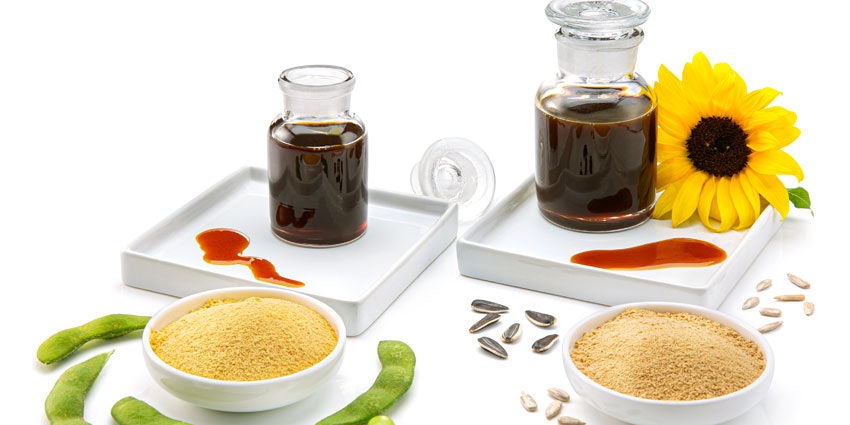is sunflower lecithin healthy?
In today’s health-conscious world, more people are turning to natural supplements and functional foods to improve wellness. One ingredient that’s gained popularity in the wellness and nutrition space is sunflower lecithin. Often sold as a powder, liquid, or in capsules, sunflower lecithin is touted for its potential benefits related to brain function, heart health, digestion, and more.
But is sunflower lecithin truly healthy—or just another supplement trend? Let’s dive into the facts to help you understand what sunflower lecithin is, how it works in the body, and whether it lives up to its health claims.
What Is Sunflower Lecithin?
Lecithin is a natural fatty substance found in both your body and various plant and animal-based sources. It plays a crucial role in your health, particularly as a major component of cell membranes. It’s most commonly found in foods like eggs, soybeans, and sunflower seeds.
Sunflower lecithin, as the name suggests, is derived specifically from sunflower seeds. Unlike soy-based lecithin, sunflower lecithin has several distinct advantages, making it a popular option in health products and functional foods. Sunflower lecithin is non-GMO, plant-based, and extracted using gentler methods, making it a cleaner, more sustainable choice for those looking to boost their health.
In food products, lecithin is mainly used as an emulsifier, helping to mix ingredients that would otherwise separate (think of how oil and water don’t mix). It’s found in many processed foods, but you can also find it as a standalone supplement in various forms like capsules, liquid, and granules.

Health Benefits of Sunflower Lecithin
1. Supports Brain Function and Memory
One of the most praised benefits of sunflower lecithin is its potential role in enhancing cognitive function. It contains choline, a nutrient that is converted into acetylcholine, an important neurotransmitter involved in memory, mood, and muscle control.
Regular intake of choline-rich lecithin may help improve mental clarity, especially in older adults or people with cognitive decline.
2. Promotes Heart Health
Sunflower lecithin may contribute to better heart health by helping to break down fats in the body and manage cholesterol levels. Its phospholipids may help reduce bad LDL cholesterol while supporting healthy HDL cholesterol, improving overall cardiovascular function.
Additionally, lecithin's emulsifying properties can help prevent the accumulation of fat in the arteries, supporting better blood circulation.

3. Aids Digestion
Sunflower lecithin is sometimes used as a natural remedy for digestive disorders. It supports the breakdown of dietary fats and can assist in forming a protective lining in the digestive tract.
Some studies have shown benefits for individuals with ulcerative colitis, a chronic inflammatory bowel condition. Lecithin may help strengthen the intestinal lining and reduce inflammation, offering relief to those suffering from digestive discomfort.

4. Supports Liver Health
The choline in sunflower lecithin is vital for liver function. It helps prevent fat accumulation in the liver—a condition known as fatty liver disease—by promoting fat metabolism and transportation.
People with liver concerns or those who consume high-fat diets may find sunflower lecithin a beneficial addition to their wellness routine.

5. Improves Skin Hydration and Elasticity
Sunflower lecithin is often added to cosmetics and skincare products for its emollient properties. Internally, its fatty acids and phospholipids support cellular hydration, helping maintain supple, hydrated skin.
This makes it a valuable supplement for those looking to support skin health from within.

6. May Assist in Breastfeeding
Sunflower lecithin is sometimes recommended for breastfeeding mothers to help prevent clogged milk ducts. It acts as a natural emulsifier, thinning milk slightly to allow for smoother milk flow. While not a substitute for medical treatment, many women find it a helpful preventive measure under guidance from a healthcare provider.

Sunflower Lecithin vs. Other Lecithin Sources: Soy and Egg Yolk
When comparing sunflower lecithin to soy lecithin and egg yolk lecithin, there are some important differences:
Soy Lecithin: While soy lecithin is the most common, it’s often derived from genetically modified soybeans (GMOs) and can pose risks for those with soy allergies. Additionally, the extraction process typically involves chemicals.
Egg Yolk Lecithin: Derived from eggs, this type of lecithin is also widely used but not suitable for vegans or those avoiding animal products. Like soy lecithin, it also requires chemical extraction methods that can leave residues in the final product.
Sunflower Lecithin: As an allergen-free, non-GMO, and plant-based alternative, sunflower lecithin is an good option for people with sensitivities to soy or eggs. It’s also produced using more gentle extraction methods that avoid the harsh chemicals used in other lecithin types, making it a cleaner and more sustainable choice overall.

Forms and How to Take It
Sunflower lecithin is available in:
Liquid form – Easy to mix into smoothies, shakes, or dressings
Powder form – Great for baking, cooking, or adding to coffee
Capsules/softgels – Convenient for daily supplementation
The ideal dosage varies depending on your goals. A general range is 1 to 3 tablespoons per day for powders or liquids, or 1,200 to 2,400 mg per day for capsules. It’s best to follow the instructions on the product label or consult a healthcare provider.

Are There Any Risks or Side Effects?
For most people, sunflower lecithin is a safe and well-tolerated supplement. However, there are a few potential risks or side effects to keep in mind:
Allergies: Although rare, some individuals may have an allergy to sunflower seeds. If you have a known sunflower seed allergy, you should avoid sunflower lecithin.
Digestive Issues: In some cases, taking sunflower lecithin in high amounts can cause mild digestive discomfort.
Interactions with Medications: Since lecithin can affect fat metabolism, it’s wise to consult a healthcare professional before starting a lecithin supplement, especially if you’re taking medications for cholesterol or blood pressure.

Conclusion
Sunflower lecithin is a safe and natural ingredient that can offer some modest benefits when included in your diet in moderation. It provides essential nutrients like potassium, phosphorus, and fatty acids, and can support the absorption of choline and fat-soluble vitamins. While it may assist with cholesterol balance, digestion, and breastfeeding for nursing moms, it’s not a miracle solution—just a helpful addition to a balanced routine. Whether in food or supplement form, sunflower lecithin is a good option for those looking for a plant-based, non-GMO alternative to other lecithin sources.
References
Zeisel, S. H., & da Costa, K. A. (2009). Choline: an essential nutrient for public health. Nutrition Reviews, 67(11), 615–623.
Sahlin, K. A., & Eriksson, M. (2008). Phosphatidylcholine as a treatment for ulcerative colitis. Inflammopharmacology, 16(5), 219–221.
EFSA Panel on Dietetic Products, Nutrition and Allergies (NDA). (2011). Scientific Opinion on the substantiation of health claims related to choline. EFSA Journal, 9(4), 2056.
Kidd, P. M. (2000). Phosphatidylserine; phosphatidylcholine and lecithin influence on cognitive performance. Alternative Medicine Review, 5(2), 144–161.
Lawrence, R. M., & Lawrence, R. A. (2010). Breastfeeding: more than just good nutrition. Pediatrics in Review, 31(7), 288–296.
Gropper, S. S., & Smith, J. L. (2012). Advanced Nutrition and Human Metabolism (6th ed.). Wadsworth Publishing.


